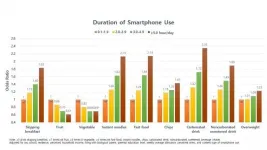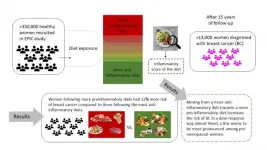(Press-News.org) Rockville, Maryland (June 7, 2021) -- Even moderate smartphone use may influence teens' diet and weight, according to a new study of more than 53,000 Korean adolescents. Teens who used a smartphone for more than 2 hours per day were significantly more likely to eat more junk food and fewer fruits and vegetables than those spending less time on their phone. Teens spending more than 3 hours per day on a smartphone were significantly more likely to be overweight or obese.
"While earlier studies have shown that TV watching is an important factor that increases the risk of obesity in children and adolescents, little is known about the effects of modern screen time such as smartphone use on diet and obesity," said Hannah Oh, ScD, assistant professor at Korea University and the study's senior author. "Our data suggest that both smartphone usage time and content type may independently influence diet and obesity in adolescents."
Childhood obesity is becoming more prevalent in many countries, including Korea and the U.S. Children with obesity are more likely to be obese as adults and face a higher risk of heart disease, diabetes and other health problems.
Seaun Ryu, a master's student at Korea University and the study's first author, will present the research at NUTRITION 2021 LIVE ONLINE.
The researchers analyzed data from the Korea Youth Risk Behavior Web-Based Survey, a nationally representative sample of over 53,000 Korean adolescents 12-18 years old. After accounting for variables such as socioeconomic status that may influence both obesity and smartphone ownership, the researchers examined the prevalence at which participants engaged in healthy behaviors (eating fruits and vegetables) and unhealthy behaviors (skipping breakfast and consuming fast food, chips, instant noodles or carbonated or sweetened beverages) relative to the amount of daily smartphone use and the types of content used.
The prevalence of unhealthy behaviors and overweight rose with increasing daily smartphone use. Teens spending 5 or more hours per day on their phone were more likely to report consuming carbonated and noncarbonated sugar-sweetened beverages, fast food, chips, and instant noodles compared to those spending less than 2 hours per day on their phone.
Teens who reported using their phones more for information search and retrieval overall had healthier eating behaviors than those using their phones more for chatting/messenger, gaming, video/music and social networks. Respondents who used their smartphone most frequently for gaming, video/music or webtoon/web-novel were more likely to be overweight or obese.
Oh said potential drivers behind these trends could include exposure to food marketing in digital spaces, an increased propensity toward "mindless" eating while using a smartphone, inadequate sleep, or the displacement of time that would otherwise be spent on physical activity. She stressed the need to monitor food marketing targeting adolescents in digital media and, if warranted, work to prevent teens from being exposed to aggressive marketing or misleading messages about unhealthy foods. On the flip side, she noted that smartphones could be leveraged to improve public health through nutrition-tracking apps or by using digital platforms to make information about healthy eating more accessible.
"Adolescents of today are digital natives, who have grown up in close contact with digital devices such as smartphones, and thus are likely to be heavily influenced by them," said Oh and Ryu. "Efforts should be taken to maximize the positive effects and minimize the negative effects of smartphone use on adolescent health."
The researchers cautioned that the study was not designed to determine the temporal relationship between obesity and smartphone use; a longitudinal, prospective study would be needed to assess changes in body weight and smartphone use over time.
Ryu will present this research in an on-demand poster session during NUTRITION 2021 LIVE ONLINE from noon on Monday, June 7 through 5:30 p.m. on Friday, June 10 (P23-065-21, abstract; presentation details).
Images available.
Please note that abstracts presented at NUTRITION 2021 LIVE ONLINE were evaluated and selected by a committee of experts but have not generally undergone the same peer review process required for publication in a scientific journal. As such, the findings presented should be considered preliminary until a peer-reviewed publication is available.
INFORMATION:
About NUTRITION 2021 LIVE ONLINE
NUTRITION 2021 LIVE ONLINE, held June 7-10, 2021 is a dynamic virtual event showcasing new research findings and timely discussions on food and nutrition. Scientific symposia explore hot topics including clinical and translational nutrition, food science and systems, global and public health, population science and cellular and physiological nutrition and metabolism. https://meeting.nutrition.org #NutritionLiveOnline
About the American Society for Nutrition (ASN)
ASN is the preeminent professional organization for nutrition research scientists and clinicians around the world. Founded in 1928, the society brings together the top nutrition researchers, medical practitioners, policy makers and industry leaders to advance our knowledge and application of nutrition. ASN publishes four peer-reviewed journals and provides education and professional development opportunities to advance nutrition research, practice and education. http://www.nutrition.org
Find more news briefs and tipsheets at: https://www.eurekalert.org/meetings/nutrition/2021/newsroom. Watch on-demand
sessions, view posters and more by registering for a END
Rockville, Maryland (June 7, 2021) -- Studies being presented at END ...
Rockville, Maryland (June 7, 2021) -- A new study of more than 350,000 women found that women with diets incorporating more foods that increase inflammation in the body had a 12% increase in their risk of breast cancer compared to women who consume more anti-inflammatory diets. The new findings are being presented at NUTRITION 2021 LIVE ONLINE.
The study authors found that moving from a more anti-inflammatory diet toward one that increases inflammation upped breast cancer risk in an almost linear manner. Foods that increase inflammation include red and processed meat; high-fat foods such as butter, margarines and frying fats; and ...
Rockville, Maryland (June 7, 2021) -- What did Americans eat during the Great Recession? A new study suggests dietary quality plummeted along with the economy.
According to the study, adults overall ate more refined grains and solid fats and children increased their intake of added sugar during the recession. The impacts of the downturn were especially pronounced in food-insecure households, where individuals significantly reduced their intake of protein and dark green vegetables while increasing total sugars.
"Overall, we found that the Great Recession had a negative impact on dietary ...
Rockville, Maryland (June 7, 2021) -- There has been a long-standing debate as to whether a low-fat or a plant-centered diet is better at lowering the risk of cardiovascular disease. A new study that followed more than 4,700 people over 30 years, found that a plant-centered diet was associated with a lower long-term risk for cardiovascular disease. However, both diets were linked with lower LDL, or bad cholesterol, levels.
"Since 1980, dietary guidelines in the United States and in Europe have recommended eating low amounts of saturated fat because of the high rates of heart disease in these regions," said research team leader David Jacobs, PhD, from the University of Minnesota. "This is not necessarily wrong, but our study shows that plant-centered ...
Rockville, Maryland (June 7, 2021) -- As COVID-19 spread throughout the world, our daily routines and behaviors changed drastically. A new study of more than 2,000 people in the U.S. found that the pandemic has also affected how we eat. The authors found a decrease in the consumption of many food groups, particularly healthy foods such as vegetables and whole grains, compared to before the pandemic.
"When the pandemic began, we saw panic buying, problems in the food supply chain, increases in food prices and rising unemployment rates," said Caroline Um, PhD, a postdoctoral fellow at ...
Concerned youths worldwide today delivered a policy vision for policy-makers to address the declining state of the world's ocean.
A carbon neutral economy, preserving biodiversity, achieving sustainable seafood production, and reforming ocean governance are the four fundamental pillars supporting policy recommendations debuted in the Global Blue New Deal, an ocean policy framework built around crowd-sourced youth priorities.
"Healthy oceans are essential to human survival and well-being, and environmental health must be a global priority as we recover from the pandemic and build a sustainable blue economy," says Mark Haver, Chair of the Sustainable Ocean Alliance's Youth Policy Advisory Council.
He and 14 fellow Young Ocean Leaders ...
During his time at EPFL under the Erasmus program, Romain van Wassenhove came up with an idea for a connector that could be used to make modular structures out of sustainable bamboo rather than wood, plastic or metal. "I wanted to focus my Master's on a topic that had meaning to me and that would lead to a concrete application," he says. "Working with bamboo was something I already had in mind while I was studying in Brussels." His connectors can be 3D-printed in biosourced plastic and are customizable to the type of material used for the structure.
Van Wassenhove got the idea for his connector during a class at EPFL on composite materials and developed the concept further through his Master's project, co-directed at EPFL by Senior Scientist Anastasios Vassilopoulos and by associate ...
Scientists from the University of Graz (Austria), Skoltech and their colleagues from the US and Germany have developed a new neural network that can reliably detect coronal holes from space-based observations. This application paves the way for more reliable space weather predictions and provides valuable information for the study of the solar activity cycle. The paper was published in the journal Astronomy & Astrophysics.
Much like our life on Earth depends on the light of the Sun, our electronic "life" depends on the activity of our closest star and its interactions with Earth's magnetic field. For the ...
Carbon loss in Canadian peatland is projected to increase by 103 per cent under a high emission scenario, according to new research led by scientists from the University of Waterloo.
The results of the study, which was published today in Nature's Communications Earth & Environment journal, reinforces the urgent need for a comprehensive understanding of peatlands as evolving sources of atmospheric CO2 in a warming world.
Peatlands, which are a type of wetland, are some of the most valuable ecosystems globally. In addition to their role in preserving biodiversity and minimizing ...
Older Chinese immigrants who adjust to their new cultural environment by learning the language, following the country's media and socializing with local residents can reduce acculturation gap with their adult children and protect their cognitive function, according to a Rutgers study.
The study, published in the journal Aging and Mental Health, is one of the first to explore the relationship between intergenerational families, acculturation and cognitive function among older Chinese Americans.
Researchers looked 2,900 Chinese Americans over age 60 who had at least one child and who participated in the PINE Study, an epidemiological study of older Chinese Americans. They analyzed three areas of acculturation - language, media use and ethnic social relations - and how they corresponded ...






